
Staff
-

ProfessorAtsunori KuwabaraAtsunori Kuwabara
-
Associate Professor with Special AssignmentShigeki KatoShigeki Kato
-
Assistant ProfessorYoshiko WatanabeYoshiko Watanabe
-
Assistant ProfessorNaohito YamashitaNaohito Yamashita
- Overview of our department
In 1980, Our department was established under the name of “General Medicine” for the first time at a Japanese medical school.
Our primary goal is to train "General Physicians" who can deal with patients’ diverse symptoms, values, and complex health problems.
To achieve this goal, we provide education to medical students and post-graduate residents as described below. - Medical student education
For 3rd-year medical students
They learn to obtain a basic medical interview and perform the essential physical examinations, all of which comprise necessary knowledge and skills for all physicians.
For 4th- and 5th-year medical students
They mainly examine patients who visit our department with various symptoms and reasons in small group with a supervising physician.
After discussing the results of the medical interview and physical examination with the supervising physician, the students plan the necessary laboratory tests and/or imaging studies to be prescribed for the patient.
For 6th-year medical students
We provide these students with further skills in outpatient practice.
They independently conduct medical interviews and physical examinations, and build diagnostic hypotheses, which take into consideration the most frequent conditions and those that should not be missed.
Based on this diagnostic strategy, the students report the results of their patient examinations to the supervising physician and plan the necessary laboratory tests and/or imaging studies under her/his guidance. - Post Graduate Medical Education
Junior residents (one or two years after graduation) independently and by themselves perform medical interviews and physical examinations for new outpatients.
Especially, they acquire clinical practice pattern in management of common cold, a condition whereby a patient comes to an outpatient clinic claiming to have caught a cold.
In addition to the above, senior residents (three years after graduation) manage the patients with biomedical, psychosocial and economic problems through interprofessional collaboration. They learn and practice the steps to apply Evidenced based medicine (EBM) to patients.
EBM is "the conscientious, explicit and judicious use of current best evidence in making decisions about the care of individual patients."
The residents convert questions that arise in daily practice (clinical questions) into the verifiable questions (research questions), plan and practice basic research and/or clinical research. - Our research areas
1) Evaluation of gastrointestinal motility with ultrasonography
2) The quality of medical care
